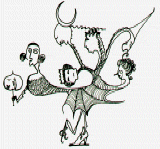|
Antique inlaid mahogany writing
box with side drawer and drop handles and reading stand Circa 1790
Please click on images to enlarge | slide show | thumbnail
index |
Reference: wb144
Description:
WB 144 Mahogany late 18th century writing box the top inlaid with maple
inlay depicting a patera and edged with a cross banding in laburnum to
the top. The box has drop side handles and a side drawer for papers.
Inside there is a leather covered writing surface and further
compartments for papers and writing implements. The box also has a riser
mechanism to enable it to be used as a reading stand/ lectern.
circa 1790.
Origin: UK
Circa: 1790.
Size: 51.3 cm by 26.8 cm by 16 cm: 20.2 inches by
10.5 inches by 6.3 inches. Condition:
good overall, however this box has been used and is an early writing
box. There are little repairs. one of the flaps have been re-enforced by
having a piece of cloth glued to it. See images.
|

|

|
Detail: the top is
edged with a cross banding in laburnum and light and dark wood lines.
|
Please click on images to enlarge | slide show | thumbnail
index |

|
The box has a central inlay
to the top depicting a stylized patera. The inlay is executed in maple
which has been shaded by scorching. This process was often done by
dipping the elements in hot sand.
The patera motif in its
various forms was an abstraction of a shallow dish used in the classical
world for offering libations.
Most writing boxes of this
era were for military use and were either simple or brass inlaid. Decorative
inlay is very rare.
|
The box also has a riser
mechanism to enable it to be used as a reading stand/ lectern.
The drop side handles are a
feature of early boxes.
|

|
Please click on images to enlarge| slide show | thumbnail
index |
There are compartments for storing pens.
|

|

Dovetail joints:
The dovetail joint is one of the
wonders of woodwork. In the full blind none of the careful work is
visible. If the joint is simply mitered it will not survive
atmospheric change. A mitered joint is end grain to end grain. The
glue soaks in, becomes dry and brittle and falls apart.
The dovetail joint enables side
grain to be glued to side grain. These joints would hold together
without glue!
It is the true proof of these
dovetail joints made by craftsmen 200 years ago that their joints are
as they made them.
This image is courtesy
of Fine Woodworking Techniques 1978 Taunton Press inc. ISBN:
0918804027
|
The box is constructed with full-blind
dovetail joints. The brass is fixed with iron screws which have their
heads ground down level with the brass. The result is a strong and stable
box which has survived well the harsh environments it has had to
encounter,
Extract: Choosing and Making the right
joints by Tage Frid.

This image is courtesy of Fine Woodworking Techniques 1978
Taunton Press inc. ISBN: 0918804027
You can
order the Fine Woodworking Techniques from Amazon by clicking one of the links below:
|
Please click on images to enlarge

|
The drawer has half blind dovetail joins to the
front. The joins at the other end of the drawer are full dovetails.
The bottom of the drawer is lined with blue paper.
This is original to the box.
|
The embossed leather writing surface is a modern
replacement.
|

|
Please click on images to enlarge| slide show
| thumbnail
index |
Please click on images to enlarge| slide show | thumbnail
index |
Please click on images to enlarge| slide show | thumbnail
index |
Please click on images to enlarge| slide show
| thumbnail
index |
Please click on images to enlarge
Request
current list of available writing boxes.
News
| Buying
| email | Online
History of boxes | The
Schiffer Book |
All text and images and linked images are ©
1999-2008 Antigone Clarke and Joseph O'Kelly. If you require any further
information on permitted use, or a licence to republish any material, email us
at copyright@hygra.com
| 